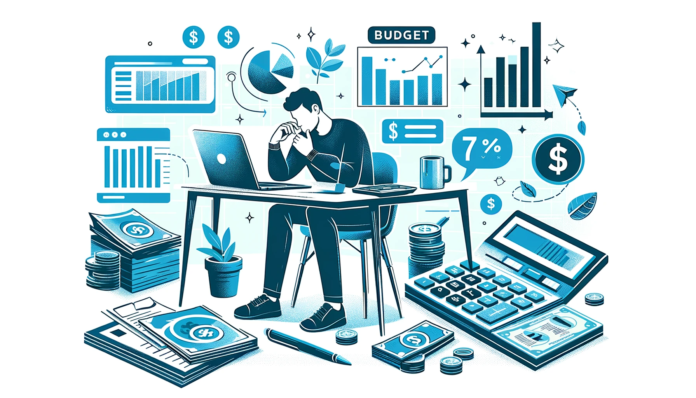What is Budgeting?
Budgeting is an important part of managing money. It is the process of planning and organizing how you will spend and save money. A budget can help you to know where your money is going and how much money you have left over after all expenses are paid. Creating a budget also takes into account both fixed expenses, such as housing costs, and variable expenses, such as utility bills. Tracking your spending can be an important budgeting tip, allowing you to adjust your budget according to how much you are spending in different categories.
Setting aside money for an emergency fund is also a key part of budgeting, as it will enable you to still pay for necessary expenses, even if something unexpected occurs. Knowing your full financial situation is an important part of budgeting, as it will allow you to make wise choices when you need to spend or save money. Paying off debt is another important budgeting tip, as it will allow you to free up money that can be put towards other expenses or saved for later. Budgeting is a powerful tool that can enable you to reach your financial goals and make sensible decisions when it comes to spending and saving money.
Tracking Your Spending
Monitoring your income and expenditure is a great way to ensure that you are saving enough money to cover unexpected expenses. Taking the time to keep track of your paychecks and money aside for saving or retirement will help you stay on track with your budget. Setting aside a part of your paycheck each month will help you save money for your future or unexpected expenses. Subtracting the amount of money you are spending away from the total of your paycheck will help you to avoid overspending. Tracking your expenditure will help you to ascertain if you need to adjust your budget to stay on target.
Calculating Your Net Income
To make a budget, you need to know your net income. This is the money that you have to work with when it comes to money management and budgeting goals. Calculate the amount of money you have coming in each month for budget money, debts repayment and other money management needs. All sources of income should be included. Track where your money is going and identify practical budgeting tips to help you on your challenging budgeting journey. Consider downloading a budgeting app to help you easily manage your budget and to track how much money you have each month. All of this can help you plan for the future and establish realistic budgeting goals.
Remember, budgeting is a marathon, not a sprint. With dedication and practical budgeting tips, you can manage your budget and reach those long-term budgeting goals. Good luck!
Expect the Unexpected
No matter how organized you are with your budgeting, the perfect plan won’t always turn out to be perfect in real life. Unexpected expenses, such as medical bills or car repairs, can come up and run out of money. Similarly, some months you might have more easy money than you budgeted for. This is why you should always use a budgeting tool that’s flexible and leaves room for adjustments.
With the right control of your money, you’ll be able to put money towards debt repayment, saving money, and necessary expenses. If you’re looking for budgeting tips, it’s important to remember to plan for the money you’ve already earned and for money you’ve already spent. When you budget for the future, be sure to include a cushion for the unexpected. This way, you can ensure that you can adjust your budget as needed.
Here are some tips to help you expect the unexpected:
- Create an emergency fund. This should be a separate account that is used for unexpected expenses.
- Set aside money each month and add it to your emergency fund so that if something does come up, you’ll have the money available.
- Be realistic when budgeting. Even if you think something won’t happen, plan for it just in case.
- Review your budget regularly. Make sure that your spending and saving habits are still on track with what you planned for.
Finally, remember that life can throw curveballs at any time. It’s important to be prepared financially by having an emergency fund and adjusting your budget as needed. That way, when the unexpected happens, you’ll be ready!
Creating a Budget
Once you have tracked your spending and calculated your net income, you’re ready to create your budget. Don’t be too hard on yourself – start small. List down the “wants” from the “needs,” figure out your average income and expenses, then create a monthly budget. Subtract your monthly expenses from your income and see how much money you have left. A budget is a plan for how you want to use your money and it takes trial and error to decide which budgeting method works best for you. To help you ensure you are sticking with your budget, calculate your estimated monthly expenses such as rent, groceries, and bills. To help you more effectively budget, make sure to budget before the month begins.
Adjusting Your Budget
Once you have an established budget and you have been tracking your spending, it is time to adjust your budget. You should start by setting aside a small amount of money every month into a savings account. This can be used as an emergency fund, or to start making a plan towards saving for retirement or a big expenditure. Take savings seriously – it is an important step in budgeting process and may make a huge difference in your financial situation.
Once you have started saving for the future, it is important to calculate your net income and manage your money differently. By allocating money to savings and debt, you can get out of debt and start to build wealth. Making small changes gradually can help you stick to your budget and help you start saving. Once it is established that you are doing well, you can start putting more money into your savings and reap the rewards of budgeting.
Budgeting Money for Fixed Expenses
One way to make budgeting easier is to allocate money to fixed expenses. A fixed expense is something that you have to pay every month, such as rent, gas, electric, phone, internet, and so on. Every dollar you set aside for each of these expenses makes budgeting simpler because you know how much you need to spend on them. Start budgeting by finding out how much your fixed expenses cost you each month, then set aside money from your income for these items. This simple budgeting helps you track your expenses for the month.
When budgeting for fixed expenses, you should also consider budget cuts. Use these budgeting tips to save money and create a system for budgeting that works well for you. Some people prefer to use a budgeting app, while others rely on their own tracking system to calculate their income and expenses. Whether you use digital tools or do it manually, make sure that the fixed expenses are part of your budget. This helps you save money for your goals and enables you to easily plan your finances ahead of time. It’s important to know exactly how much money you have coming in each month to budget in college or any time of life.
Debt Repayment and Budgeting
Debt repayment should be a key part of every budget. Make a list of any debt that needs to be repaid and determine what you need to pay and how often. You will want to save enough money to cover debt payments and any unexpected expenses which can come up, because you should always expect the unexpected. This way, you will have more control over your finances and you will know where your money goes.
Put money aside on a regular basis so that you can effectively budget accordingly and have set payments ready for debt repayment. Visit your bank or credit union to make sure you have the most successful debt repayment plan. A budget should include debt repayments, so make sure to plan for it before the month begins. With an effective budget, you can control your finances and have a clearer idea of where your money will be going.
Managing Your Budget
Sticking to a budget can be difficult at first, but with a bit of practice it can become an easy habit. Start by tracking your monthly income and expenses so that you can have a better understanding of how your money is being used. If you have a first credit card, adjust your spending and aim to save at least three to six months of expenses to help you stay out of debt. Calculate your income minus expenses to get an idea of your disposable income. Start paying off student loan debt and other debts before accumulating more.
Once you have a good understanding of where your money is going, you can start creating a budget. A budget can start by itemizing monthly expenditures like rent, utilities, groceries, and debt repayment and then allocating a portion of the remaining income for discretionary expenses. You should aim to save at least 10-15 percent of your income as you become better at budgeting. Setting up automatic transfers can help make saving easier and getting in the habit of budgeting is the most important part. Having extra money saved, in case of an emergency, will help you stay on track with your budget and provide financial security.
Budgeting Before the Month Begins
Planning your budget before the month begins is a great way to make sure you are successfully managing your finances. It is important to take into account saving for a vacation, as well as day-to-day and mandatory expenses to live comfortably. Beginning at the start of the month, make sure to keep track of all of your income and spending, and consider factors such as how much interest you are paying, or you are saving. This way, you can adjust accordingly, so that your income could lead to a more positive outcome of financial security.
Making sure to save extra for those surprise expenses or for any emergency repairs can help you avoid going into debt and help you pay off your debt as fast as possible. Keeping a printed or digital budget planner can be extremely helpful for keeping track of your income and spending and planning out how to budget accordingly. Writing down your budget either manually with a pen and paper or digitally can ensure that you are staying disciplined with your budget, so you are able to avoid being short on cash at the end of the month.
FAQS
What is Budgeting?
Budgeting is the process of creating a plan to spend your money. It helps you take control of your finances, organized both your income and expenses, and make sure you have enough money to cover your needs.
How do I track my spending?
Tracking your spending is an essential part of budgeting. You can do this by using budgeting software to keep track of all your spending, or you can use a simple spreadsheet to track your income and expenses. Check out apps like Mint or YNAB to make tracking your spending even easier.
How do I calculate my net income?
Calculating your net income is a key part of budgeting. To do this, you’ll need to subtract all of your expenses from your income. This will give you an idea of how much money is left over after you pay all your bills.
How should I go about creating a budget?
Creating a budget can seem daunting, but it’s actually quite simple. Start by making a list of your income and expenses. Then, create a plan to manage your money: determine how much will go towards bills, savings, and spending. Finally, make sure to track your spending so you can adjust the budget as needed.
How often should I adjust my budget?
It’s important to adjust your budget as needed. Your income, expenses, and spending habits might change over time, so make sure to review your budget regularly.
How do I budget money for fixed expenses?
Budgeting money for fixed expenses is an important part of budgeting. Make sure to include all your fixed expenses in your budget, such as rent, utilities, and transportation costs.
How does debt repayment and budgeting work together?
Debt repayment and budgeting go hand in hand. Make sure to budget enough money for debt repayment, as this will help you pay off your debts faster and free up more money for other expenses.
What are some ways to manage my budget?
There are several ways to manage your budget. Set up automatic payments to make sure you never miss a payment, track your spending to make sure you don’t overspend, and use budgeting software to make budgeting easier.
How can I prepare for budgeting before the month begins?
Preparing for budgeting before the month begins can help you make sure you have enough money to cover all your expenses. Start by reviewing your income, expenses, and spending habits. Then, create a budget and track your spending throughout the month. Finally, make any necessary adjustments to your budget.
Learn More
- Explore time-tested budgeting approaches on Forbes
- Read NerdWallet’s comprehensive guide on how to budget money
- Discover best practices in budgeting from the Government Finance Officers Association
Related
- Insurance 101: Common Questions and Concerns Answered by Everyday Life Insurance
- Mastering the Art of Sticking to a Budget Efficiently
- Mastering the Financial Planning Process: A Comprehensive Guide















